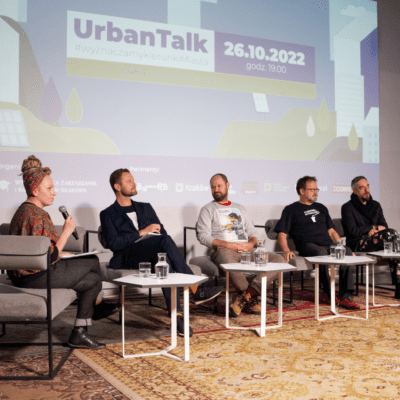Graffiti – when does art end and vandalism begin? – is the topic of the ninth debate in the UrbanTalk series #wesetdirections of the city, organized by The School of Management and Banking in Krakow.
On October 26th The School of Management and Banking in Krakow invited Artur Wabik – visual artist, curator, publicist, pop culture researcher, Robert Piaskowski – plenipotentiary of the mayor of Cracow for cultural affairs, and Waldemar Domanski – founder of the group Pogromcy Bazgrołów to a discussion titled “Graffiti – when does art end and vandalism begin?”. The meeting was moderated by activist Izabela Chyłek, councilor Edyta Kruk and Dr. Borys Makary, vice chancellor of WSZiB.
Forms of expression in public space
Forms of expression and differences between genres of artistic phenomena in public space were outlined by Artur Wabik. To the question about the connection between graffiti and street art, the artist answered that they are different but related phenomena. Murals do not fit into the concept of graffiti and street art. According to the speaker, it is difficult to find an answer to the question of when art ends and vandalism begins, because the problem lies on several levels, both artistic and legal, and even personal.
What does the city think about graffiti?
In the city marking movement, we encounter both the expression of the identity of neighborhoods manifested in urban folklore and the phenomenon of vandalizing public space, i.e. disagreement with the city. Whether an artistic intervention or a dialogue with other artists, graffiti marks various types of presence in the city (an in-between phenomenon), as Robert Piaskowski pointed out. The city has established an interdisciplinary team preceded by research to manage the process of large-format painting. It faces three main challenges, namely promoting more worthy works, reducing commercial abuse of public space for pseudo-paintings, and standards for deciding whether to paint over existing murals.
“Pogromcy Bazgrołów”
Thanks to the activities of the group Pogromcy Bazgrołów, the number of unaesthetic graffiti has been reduced by 1/3. The creator of the group is Waldemar Domański, one of the speakers at the debate. The aim of the group is to reduce the harmful phenomenon of devastation of public space by encouraging communities to feel the responsibility for the immediate environment. We should add that the Municipal Transport Company of Krakow closely cooperates with the group, and their activities are manifested in the identification of new paintings by train drivers.
Why does vandalism occur in public spaces?
Defining the city’s three-dimensional public space, according to Robert Piaskowski, should be defined by law. Accepting permanently the existence of vandalization in public space for speakers is a disputable matter. However, tools from the level of integration, social control, municipal services or community integration to combat this phenomenon are key. The Krakow Mayor’s Representative for Culture characterizes the concept of criminalizing street art as something at the intersection of sociology, economics and social integration. He outlines that it is a form of rebellion, marginalization of a group, search for identity as well as aestheticization of the city.
The city is working on systemic solutions
One of them is the possibility of obliging the owner that has received funding for renovation work to take care of the facade of such a building. The city is also looking for ways to protect public spaces through modern solutions, such as the use of protective impregnates. The science and level of preservation knowledge is advancing so rapidly that there are now demonstrations of lasers that can remove, through sound waves, deposits from any organic material. Rober Piaskowski explains that it would be necessary to look deeper into issues that concern the development of a management model tailored to Krakow’s needs.
For more information and photos from the debate, visit: www.wszib.edu.pl/urbantalk/
